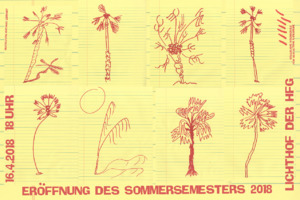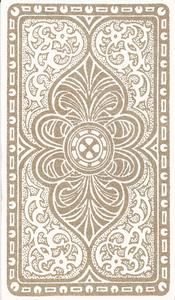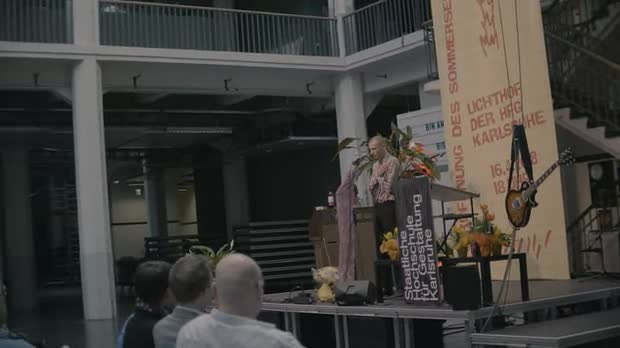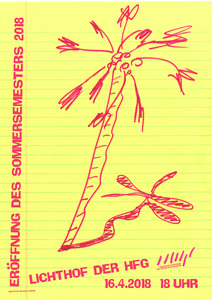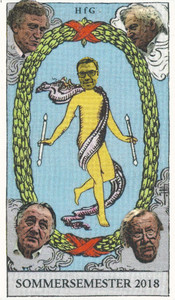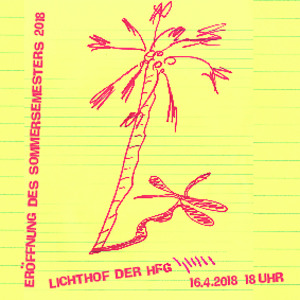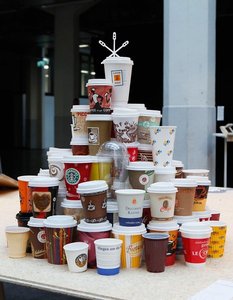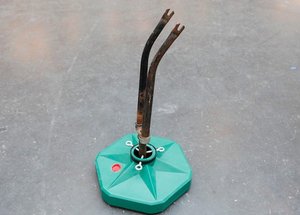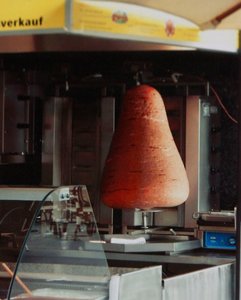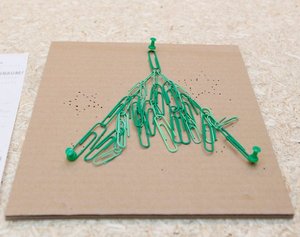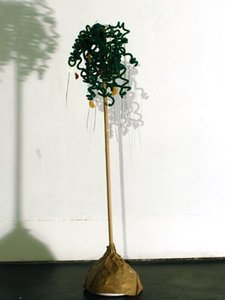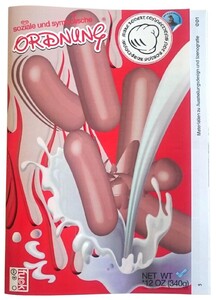"DE - Deutschland"
| Begriff | DE - Deutschland |
| Beschreibung | Deutschland - DE - 🇩🇪 |
| URL | |
| Metakey | ISO-Ländercode (creative_work:iso_country_code) |
| Typ | Country |
| Vokabular | Werk |
82 Inhalte
- Seite 1 von 7
Onlinebanner zur Semestereröffnung
- Titel
- Onlinebanner zur Semestereröffnung
- Autor/in
- Schlagworte
- Datierung
- 16.04.2018
- Mitwirkende
- Sprache
- Ort
- Lichthof der HfG
- Stadt
- Land
- Titel
- Onlinebanner zur Semestereröffnung
- Urheberrechtshinweis
- Mathias Lempart /HfG
- Importiert am
- 20.04.2018
- Übergeordnete Sets
- 0
Abgeworfene Karte -Rückseite
- Titel
- Abgeworfene Karte -Rückseite
- Autor/in
- Schlagworte
- Datierung
- 16.04.2018
- Mitwirkende
- Sprache
- Ort
- Lichthof der HfG
- Stadt
- Land
- Titel
- Abgeworfene Karte -Rückseite
- Urheberrechtshinweis
- ?? / Archiv der HfG
- Importiert am
- 19.04.2018
- Übergeordnete Sets
- 0
Semestereröffnung Sommer 2018
- Titel
- Semestereröffnung Sommer 2018
- Titel (en)
- Opening of Semester 2018
- Autor/in
- Typ des Projekts/Werks
- Datierung
- 16.04.2018
- Mitwirkende
- Dank an
- Sprache
- Dauer
- 00:51:30
- Ort
- Lichthof HfG
- Stadt
- Land
- Titel
- Semestereröffnung Sommer 2018
- Urheberrechtshinweis
- Christian Haardt
- Rechtsschutz/Lizenz
- Medienersteller/in
- Importiert am
- 17.04.2018
- Übergeordnete Sets
- 0
Poster zur Semestereröffnung
- Titel
- Poster zur Semestereröffnung
- Autor/in
- Schlagworte
- Datierung
- 16.04.2018
- Mitwirkende
- Sprache
- Ort
- Lichthof der HfG
- Stadt
- Land
- Titel
- Poster zur Semestereröffnung
- Urheberrechtshinweis
- Mathias Lempart /HfG
- Importiert am
- 20.04.2018
- Übergeordnete Sets
- 0
Abgeworfene Karte (Vorderseite)
- Titel
- Abgeworfene Karte (Vorderseite)
- Autor/in
- Schlagworte
- Datierung
- 16.04.2018
- Mitwirkende
- Sprache
- Ort
- Lichthof der HfG
- Stadt
- Land
- Titel
- Abgeworfene Karte (Vorderseite)
- Urheberrechtshinweis
- ?? / Archiv der HfG
- Importiert am
- 19.04.2018
- Übergeordnete Sets
- 0
Instagram zur Semestereröffnung
- Titel
- Instagram zur Semestereröffnung
- Autor/in
- Schlagworte
- Datierung
- 16.04.2018
- Mitwirkende
- Sprache
- Ort
- Lichthof der HfG
- Stadt
- Land
- Titel
- Instagram zur Semestereröffnung
- Urheberrechtshinweis
- Mathias Lempart / HfG
- Importiert am
- 20.04.2018
- Übergeordnete Sets
- 0
Christmas to go
- Titel
- Christmas to go
- Titel (en)
- Oh Tannenbaum!
- Autor/in
- Typ des Projekts/Werks
- Schlagworte
- Datierung
- 2009
- Ort: Institution
- Stadt
- Land
- Beteiligte Institution(en)
- Internetlinks
- Titel
- Christmas to go
- Urheberrechtshinweis
- Evi Künstle / Hochschule für Gestaltung Karlsruhe
- Rechtsschutz/Lizenz
- Medienersteller/in
- Semester
- Importiert am
- 17.12.2018
- Übergeordnete Sets
- 1
Rodolphe
- Titel
- Rodolphe
- Titel (en)
- Oh Tannenbaum!
- Autor/in
- Typ des Projekts/Werks
- Schlagworte
- Datierung
- 2009
- Ort: Institution
- Stadt
- Land
- Beteiligte Institution(en)
- Internetlinks
- Titel
- Rodolphe
- Urheberrechtshinweis
- Evi Künstle / Hochschule für Gestaltung Karlsruhe
- Rechtsschutz/Lizenz
- Medienersteller/in
- Semester
- Importiert am
- 17.12.2018
- Übergeordnete Sets
- 1
Dönerbaum
- Titel
- Dönerbaum
- Titel (en)
- Oh Tannenbaum!
- Autor/in
- Typ des Projekts/Werks
- Schlagworte
- Datierung
- 2009
- Ort: Institution
- Stadt
- Land
- Beteiligte Institution(en)
- Internetlinks
- Titel
- Dönerbaum
- Urheberrechtshinweis
- Evi Künstle / Hochschule für Gestaltung Karlsruhe
- Rechtsschutz/Lizenz
- Medienersteller/in
- Semester
- Importiert am
- 17.12.2018
- Übergeordnete Sets
- 1
Bürobaum
- Titel
- Bürobaum
- Titel (en)
- Oh Tannenbaum!
- Autor/in
- Typ des Projekts/Werks
- Schlagworte
- Datierung
- 2009
- Ort: Institution
- Stadt
- Land
- Beteiligte Institution(en)
- Internetlinks
- Titel
- Bürobaum
- Urheberrechtshinweis
- Evi Künstle / Hochschule für Gestaltung Karlsruhe
- Rechtsschutz/Lizenz
- Medienersteller/in
- Semester
- Importiert am
- 17.12.2018
- Übergeordnete Sets
- 1
tanne oder palme, dass ist hier die frage
- Titel
- tanne oder palme, dass ist hier die frage
- Titel (en)
- tanne oder palme, dass ist hier die frage
- Autor/in
- Datierung
- WS 2004
- Ort: Institution
- Ort
- Hochschule für Gestaltung Karlsruhe
- Stadt
- Land
- Titel
- tanne oder palme, dass ist hier die frage
- Urheberrechtshinweis
- Filiz Uysaler
- Rechtsschutz/Lizenz
- Semester
- Importiert am
- 03.07.2018
- Übergeordnete Sets
- 1
MAS 001
- Titel
- MAS 001
- Untertitel
- Judith Barry
- Autor/in
- Beschreibung (de)
- "Materialien zu Ausstellungsdesign und Szenografie" ist eine neue Publikationsreihe des Fachbereichs Ausstellungsdesign und Szenografie der HfG Karlsruhe. Sie setzt sich mit der Gestaltung von narrativen Räumen als kritischer Designpraxis auseinander. Materialien zu Ausstellungsdesign und Szenografie ist als fortlaufende Materialsammlung angelegt, in der Beiträge zu Diskussionen in unserem Fachgebiet zusammengetragen und zugänglich gemacht werden. Wir betrachten die einzelnen Ausgaben als Ausstellungsräume und die bedruckten Seiten als Displays. Dabei geht es uns nicht vorrangig um die Produktion neuer Beiträge sondern um bestehende Materialien, die durch ihre Auswahl, Kombination, Kontextualisierung oder Kommentierung, sowie ihre gestaltete Darstellung in Printform neue Zusammenhänge und Perspektiven herstellen.
Die erste Ausgabe von "Materialien für Ausstellungsdesign & Szenografie" beschäftigt sich mit Ausstellungsdesign als einer künstlerischen Praxis, die in den 1980er Jahren verstärkt sowohl von Künstlern als auch von Architekten und Designern als eigene Ausdrucksform in Anspruch genommen wurde. Ein Interview mit der amerikanischen Künstlerin Judith Barry beschreibt, wie in der politisierten Kunst der 1980er Jahre auf Design zurückgegriffen wurde. Helmut analysiert das komplizierte, historische Verhältnis von künstlerischer und gestalterischer Arbeit und geht der Frage nach inwieweit der sozialreformerische Anspruch von Design erneut zum Ausgangspunkt sowohl von kritischer als auch von künstlerischer Praxis werden kann.
- "Materialien zu Ausstellungsdesign und Szenografie" ist eine neue Publikationsreihe des Fachbereichs Ausstellungsdesign und Szenografie der HfG Karlsruhe. Sie setzt sich mit der Gestaltung von narrativen Räumen als kritischer Designpraxis auseinander. Materialien zu Ausstellungsdesign und Szenografie ist als fortlaufende Materialsammlung angelegt, in der Beiträge zu Diskussionen in unserem Fachgebiet zusammengetragen und zugänglich gemacht werden. Wir betrachten die einzelnen Ausgaben als Ausstellungsräume und die bedruckten Seiten als Displays. Dabei geht es uns nicht vorrangig um die Produktion neuer Beiträge sondern um bestehende Materialien, die durch ihre Auswahl, Kombination, Kontextualisierung oder Kommentierung, sowie ihre gestaltete Darstellung in Printform neue Zusammenhänge und Perspektiven herstellen.
- Beschreibung (en)
- "Materials on Exhibition Design and Scenography" is a new publication series from the department of Exhibition Design and Scenography at the HfG Karlsruhe. It deals with the design of narrative spaces as a critical design practice. "Materials on Exhibition Design and Scenography" is designed as an ongoing collection of material in which contributions to discussions in our field are compiled and made accessible. We view the individual issues as exhibition spaces and the printed pages as displays. We are not primarily concerned with the production of new contributions, but rather with existing materials that create new contexts and perspectives through their selection, combination, contextualization or commentary, as well as their designed presentation in print form.
The first issue of "Materials for Exhibition Design & Scenography" deals with exhibition design as an artistic practice that was increasingly used by artists as well as architects and designers as their own form of expression in the 1980s. An interview with the American artist Judith Barry describes how design was used in the politicized art of the 1980s. Helmut analyzes the complicated historical relationship between artistic and creative work and explores the question of the extent to which the social reformist aspirations of design have once again become the starting point for both critical and creative work.
- "Materials on Exhibition Design and Scenography" is a new publication series from the department of Exhibition Design and Scenography at the HfG Karlsruhe. It deals with the design of narrative spaces as a critical design practice. "Materials on Exhibition Design and Scenography" is designed as an ongoing collection of material in which contributions to discussions in our field are compiled and made accessible. We view the individual issues as exhibition spaces and the printed pages as displays. We are not primarily concerned with the production of new contributions, but rather with existing materials that create new contexts and perspectives through their selection, combination, contextualization or commentary, as well as their designed presentation in print form.
- Typ des Projekts/Werks
- Schlagworte
- Mitwirkende
- Dank an
- Sprache
- Abmessungen
- DIN A4
- Ort: Institution
- Stadt
- Land
- Bemerkungen
-
Heft 1: Judith Barry
40 Seiten
32 Abb., farbig & s/w.
Cover: Lotte Meret Effinger, 2015
Grafik Credits: Johannes Hucht, Yannick Nuss
-
- Titel
- MAS 001
- Urheberrechtshinweis
- Ausstellungsdesign und Szenografie, Staatliche Hochschule für Gestaltung; Grafik: Johannes Hucht, Yannick Nuss; Cover: Lotte Meret Effinger
- Rechtsschutz/Lizenz
- Beziehung/Funktion
- Projektleiter/in
- Semester
- Lehrveranstaltung
- Importiert am
- 09.05.2023
- Übergeordnete Sets
- 1
